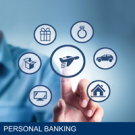Web Browsing
Regardless of the web browser you are using to access sites through the Internet, whether it’s Internet explorer, Mozilla Firefox, Safari, Opera, or Google chrome, there are some tips that you should know.
Note that a "Malware" always needs a human action to initiate itself.
- Avoid accessing sites that are unknown and especially after "suggestion" from un-trusted sources.
- Avoid clicking on pop ups (e.g. promotions). BE SUSPICIOUS!
- Avoid downloading games or free cracked software which can initiate a malware download.
- Avoid installing un-trusted software. BE SUSPICIOUS OF FREE software because it might contain viruses!
- Always verify that the website you are using is secured, by validating the HTTPS in the navigation toolbar; browsers should display a warning if they receive an invalid certificate. Do not proceed if you have received a warning of invalid certificate.
- Verify that your Bank address (URL) is secured: The letter "s" in "https" confirms that the site is fully secured (e.g. https://www.lgbonlinebanking.com).
-
Make sure you see the "Security Lock" icon on the webpage and click on it to check the website’s identity.
- On Firefox, it’s located on the Right corner of the bottom status bar and for the rest of the browsers on the Right side of the website address bar.
- Avoid using public networks to browse your online banking and check your account information or perform online transactions.














